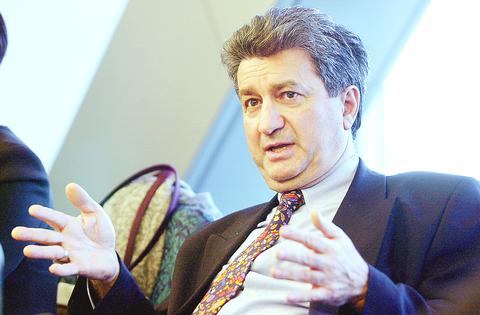While the financial markets are panicking over a flurry of negative economic figures, a leading investment bank painted a rather upbeat picture over the economy yesterday.
JP Morgan believes that the domestic economy -- now slowing at an unprecedented pace, thanks to the slumping high-tech sector -- may rebound in the second half. And the NT dollar, they predicted, may also remain "relatively stable" compared to its Asian counterparts.
"The reason why we have a sharp rebound in the second quarter is because there is the confidence factor -- if a rebound occurs, it could be quite sharp as well," said Joan Zheng, Hong Kong-based senior economist for Greater China with JP Morgan. "But the key thing is the external environment."

PHOTO: CHEN CHENG-CHANG, TAIPEI TIMES
Taiwan may see a "V-shaped recovery," which suggests a sharp recovery in the second half -- assuming that external conditions improve and Taiwan's Central Bank of China cuts interest rates, she said.
Interest rates were, in fact, lowered yesterday.
JP Morgan expects the domestic economy to grow by 3.5 percent this year against government estimates of between 4 percent and 5 percent.

PHOTO: CHEN CHENG-CHANG, TAIPEI TIMES
Taiwan's economic growth this year is unable to match the rapid growth rates of other regional economies.
"What does not go down, does not come up," said Bijan Aghevli, head of Asia-Pacific Economic and Policy Research for JP Morgan.
But the slowdown may be a blessing in disguise if that helps spur corporate and banking sector restructuring.
"We should not underestimate the challenges [of restructuring] in whichever economy we are talking about," Zheng said.
Meanwhile, most currencies in the region may continue to maintain a "weak tone in the short-term, but the NT dollar may be relatively stable," Aghevli said.
The investment bank expects the US economy to grow by 1.5 percent this year, down from last year's 5 percent. US Fed chief Alan Greenspan has adequate tools at his disposal, Aghevli said. The bank expects a 50-basis-point rate cut during the next meeting of the Federal Open Market Committee meeting on March 28.
Despite the weak outlook for technology stocks, investors should not exaggerate the impact of the "negative wealth effect" -- which means the drop in stock prices will lead to lower consumption.
"We recognize the impact of the drop in stock prices on consumer spending and consumer confidence," Zheng said. "But the conclusion is that we should not get carried away."
Nevertheless, a continued weakening in corporate earnings, increased joblessness and lackluster stock prices are likely to eat into private consumption. The good news is that the current slowdown does not augur the end of the new economy, Aghevli said.
"The decline in the US economy is a cyclical situation and it may not be V shaped, but a prolonged U shape. That is why we are optimistic. As we look forward, we will see potential growth in 2002," he said.
But Japan may be less fortunate, he said, as it has no policy flexibility, because its interest rates are already near zero and it possesses a high budget deficit, which now stands at 10 percent of the GDP.

The US dollar was trading at NT$29.7 at 10am today on the Taipei Foreign Exchange, as the New Taiwan dollar gained NT$1.364 from the previous close last week. The NT dollar continued to rise today, after surging 3.07 percent on Friday. After opening at NT$30.91, the NT dollar gained more than NT$1 in just 15 minutes, briefly passing the NT$30 mark. Before the US Department of the Treasury's semi-annual currency report came out, expectations that the NT dollar would keep rising were already building. The NT dollar on Friday closed at NT$31.064, up by NT$0.953 — a 3.07 percent single-day gain. Today,

‘SHORT TERM’: The local currency would likely remain strong in the near term, driven by anticipated US trade pressure, capital inflows and expectations of a US Fed rate cut The US dollar is expected to fall below NT$30 in the near term, as traders anticipate increased pressure from Washington for Taiwan to allow the New Taiwan dollar to appreciate, Cathay United Bank (國泰世華銀行) chief economist Lin Chi-chao (林啟超) said. Following a sharp drop in the greenback against the NT dollar on Friday, Lin told the Central News Agency that the local currency is likely to remain strong in the short term, driven in part by market psychology surrounding anticipated US policy pressure. On Friday, the US dollar fell NT$0.953, or 3.07 percent, closing at NT$31.064 — its lowest level since Jan.

The New Taiwan dollar and Taiwanese stocks surged on signs that trade tensions between the world’s top two economies might start easing and as US tech earnings boosted the outlook of the nation’s semiconductor exports. The NT dollar strengthened as much as 3.8 percent versus the US dollar to 30.815, the biggest intraday gain since January 2011, closing at NT$31.064. The benchmark TAIEX jumped 2.73 percent to outperform the region’s equity gauges. Outlook for global trade improved after China said it is assessing possible trade talks with the US, providing a boost for the nation’s currency and shares. As the NT dollar

The Financial Supervisory Commission (FSC) yesterday met with some of the nation’s largest insurance companies as a skyrocketing New Taiwan dollar piles pressure on their hundreds of billions of dollars in US bond investments. The commission has asked some life insurance firms, among the biggest Asian holders of US debt, to discuss how the rapidly strengthening NT dollar has impacted their operations, people familiar with the matter said. The meeting took place as the NT dollar jumped as much as 5 percent yesterday, its biggest intraday gain in more than three decades. The local currency surged as exporters rushed to